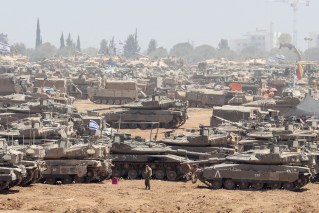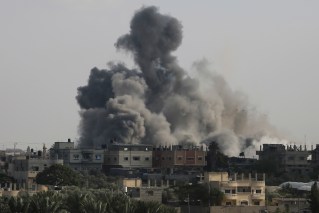Hamas appears serious about ceasefire proposal
Hamas is unlikely to reject a Gaza ceasefire proposal it received from mediators this week, but will not sign it without assurances that Israel has committed to ending the war, a Palestinian official close to the talks says.
Qatari and Egyptian mediators presented Hamas this week with the first concrete proposal for an extended halt to fighting in Gaza, agreed with Israel and the US at talks in Paris last week.
Hamas has said it is studying the text and preparing a response.
The Palestinian official said on Thursday the Paris text envisioned a first phase lasting 40 days, during which fighting would cease while Hamas freed remaining civilians from among more than 100 hostages it still holds. Further phases would feature the release of Israeli soldiers and the handover of bodies of dead hostages.
“I expect that Hamas will not reject the paper, but it might not give a decisive agreement either,” the Palestinian official said, speaking on condition of anonymity.
“Instead, I expect them to send a positive response, and reaffirm their demands: for the agreement to be signed, it must ensure Israel will commit to ending the war in Gaza and pull out from the enclave completely.”
The head of the Hamas political unit in exile, Sami Abu Zuhri, told Reuters in a message that the group had nothing to add since it announced two days ago that it was studying the truce offer.
Longest pause yet
Such a long pause would be a first since October 7, when Hamas fighters attacked Israel, killing 1200 people and capturing 253 hostages, precipitating an Israeli offensive that has laid waste to much of Gaza.
Health officials in the enclave said on Thursday the confirmed death toll had risen above 27,000, with thousands more dead still lying under the rubble.
The only pause in the fighting so far, at the end of November, lasted only a week. International aid agencies have pleaded for an extended respite to alleviate a humanitarian catastrophe in the enclave, where nearly the entire 2.3 million-strong population has been made homeless.
The big gap between the two sides appears to be over what would follow any agreed truce. Israeli Prime Minister Benjamin Netanyahu has vowed not to pull out troops until “total victory”, which he defines as eradicating Hamas.
Hamas says it will not sign any temporary truce unless Israel commits to a withdrawal and permanent end to the war.
In a sign of the seriousness of the proposal, Hamas leader Ismail Haniyeh has said he will travel to Cairo to discuss it, although no firm date has been given for his trip.
The diplomatic progress has been accompanied by some of the most intense fighting of the war.
Combat surges
Israel launched a huge ground assault last week to capture the main southern city Khan Younis, which is sheltering hundreds of thousands of displaced civilians.
Combat has also surged in northern areas that Israel claimed to have subdued weeks ago.
More than 30,000 people huddled in schools near Khan Younis’s main Nasser hospital lack water, food, baby formula and medicines, said Ashraf Al-Qidra, spokesman for Gaza’s Ministry of Health.
The Israeli military on Thursday said troops fighting at close quarters and directing airstrikes had killed “dozens of terrorists” in the past day in Khan Younis. It also reported fighting in central and northern Gaza.
Palestinian health officials said medical teams had recovered 14 bodies of Palestinians who were killed near the centre of Khan Younis after some tanks retreated from there. It was unclear when those people were killed.
In the north, where some residents had returned after Israeli forces partially withdrew in January, army planes dropped leaflets on Gaza City repeating an order for residents in several large districts to flee south.
Outside of Gaza, the war has been accompanied by escalation in a number of flashpoints across the Middle East involving armed groups allied to Israel’s foe Iran.
The Iran-aligned Houthi movement that controls most populated parts of Yemen has attacked shipping in the Red Sea, drawing retaliatory strikes from the US and Britain.
Washington said it launched fresh strikes overnight, taking out 10 drones in Western Yemen before they could take off.
-AAP








